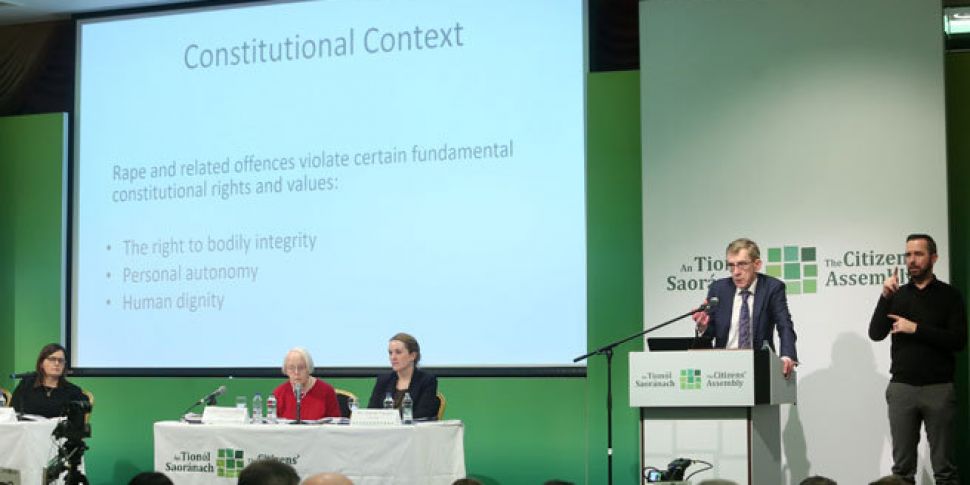And just like that, it's over.
Following six months of deliberations, the Citizens' Assembly voted yesterday to recommend to the Oireachtas that women should be allowed access to unrestricted abortion services in Ireland, by a 64% majority.
As a future referendum on abortion looks more likely than ever, it's important to consider how the Assembly came to its conclusions - and what's next in terms of potential legislation.
So what did they do?
Session One
The Citizens' Assembly met on for the first time on November 26th and 27th 2016.
The first topic the Assembly discussed was the Eighth Amendment of the Constitution, as outlined in the Resolution approving its establishment.
Article 40.3.3 and the law on abortion was explained by barrister Eoin Carolan. This was followed by private roundtable discussions and a Q&A session.
Six medical professions outlined the current practice in Ireland in terms of abortion, before another Q&A session - all speeches can be viewed here.
On day two, an overview of ethics was given by Prof. Mark Sheehan, Oxford BRC Ethics Fellow at Oxford University before further roundtable discussions and brainstorming to confirm what topics would be covered at the subsequent sessions.
Session Two
At the second convening of the Assembly, two philosophers debated whether a woman should have the right to choose an abortion in the case of a fatal fetal abnormality.
Professor Bobbie Farasides - a pro-choice philosopher from the Brighton and Sussex Medical School - and Dr Helen Watt - a pro-life researcher from the Anscombe Bioethics Centre - expressed opposing views on the issue.
The assembly also heard from experts on the medical, legal and ethical issues raised by fatal and other foetal abnormalities and how they relate to the human rights of women and the current constitutional protection of the unborn.
Session Three
Session three saw Assembly members looking at the availability of legal terminations in other jurisdictions.
As well as that, members discussed public submissions - of which over 13,000 were received. Topics such as the care path available to women who've had abortions in the UK and abortions in the case of rape were also covered.
All speeches can be viewed here.
Session Four
Weekend four of the Citizens' Assembly saw six women give first-hand testimonies directly affected by the Eighth Amendment - including those who had a crisis pregnancy and those who received a diagnosis of fatal foetal abnormality.
17 advocacy and representative groups on both sides of the debate also addressed Assembly members.
Session Five
At the final sitting of the Citizens' Assembly, the 99 members took part in four ballots:
- Firstly, Assembly members voted to recommend replacing the Eighth Amendment, as opposed to repealing - or getting rid of - the amendment entirely.
- In a follow-up vote, members voted to replace the Eighth Amendment with a provision giving explicit power to the Oireachtas to legislate for abortion, the rights of the unborn and the rights of the pregnant woman. In other words, it would be a matter for the Oireachtas to decide how to regulate these issues.
- The final vote asked members to examine eight scenarios in which the Oireachtas might legislate for abortion, and also the time limits for such abortions.
Huge vote for change. Over to the Oireachtas now. âš¡ï¸ “Final vote of #CitizensAssembly” by @Colmogormanhttps://t.co/QUPvOtPKMu
— Colm O'Gorman (@Colmogorman) April 23, 2017
The majority voted to allow abortion:
- In cases when there's substantial physical risk to woman's life
- In cases of fatal foetal abnormality
- In cases of rape
- In cases when there is serious risk to the physical health of the mother
- In cases when there is a risk to a woman's mental health
What now?
Now that consideration of the topic is completed, the Assembly will produce a report and make recommendations to the Houses of the Oireachtas. Here, elected representatives will debate the recommendations.
The joint Committee will be made up of 16 TDs and four senators.
The special committee, established earlier this month, may conduct hearings into the matter and seek input from medical and legal experts, as well as examining the position in other countries.
It will then be for the Government, with the approval of the Dáil, to recommend any changes to the Eighth Amendment.
The focus will be on issues like the wording of any such referendum. In the event that there is a referendum, it will not take place until the first half of next year at the earliest.
Previously, Minister for Health Simon Harris played down fears that the committee will overlap with the Citizens' Assembly, saying that it will only look at how to implement the Citizens' Assembly's findings.
Additional reporting from Kenneth Fox, Jack Quann and Michael Staines









